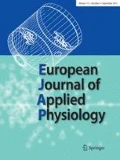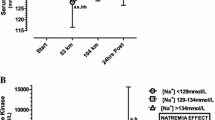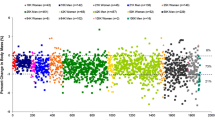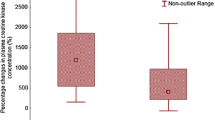Abstract
We investigated the prevalence of exercise-associated hyponatremia (EAH) in 145 male ultra-marathoners at the ‘100-km ultra-run’ in Biel, Switzerland. Changes in body mass, urinary specific gravity, haemoglobin, haematocrit, plasma [Na+], and plasma volume were determined. Seven runners (4.8%) developed asymptomatic EAH. Body mass, haematocrit and haemoglobin decreased, plasma [Na+] remained unchanged and plasma volume increased. Δ body mass correlated with both post race plasma [Na+] and Δ plasma [Na+]. Δ plasma volume was associated with post race plasma [Na+]. The athletes consumed 0.65 (0.30) L/h; fluid intake correlated significantly and negatively (r = −0.50, p < 0.0001) to race time. Fluid intake was neither associated with post race plasma [Na+] nor with Δ plasma [Na+], but was related to Δ body mass. To conclude, the prevalence of EAH was low at ~5% in these male 100 km ultra-marathoners. EAH was asymptomatic and would not have been detected without the measurement of plasma [Na+].





Similar content being viewed by others
References
Almond CS, Shin AY, Fortescue EB, Mannix RC, Wypij D, Binstadt BA, Duncan CN, Olson DP, Salerno AE, Newburger JW, Greenes DS (2005) Hyponatremia among runners in the Boston Marathon. N Engl J Med 252:1550–1556
Anastasiou CA, Kavouras SA, Arnaoutis G, Gioxari A, Kollia M, Botoula E, Sidossis LS (2009) Sodium replacement and plasma sodium drop during exercise in the heat when fluid intake matches fluid loss. J Athl Train 44:117–123
Barr SI, Costill DL, Fink WJ (1991) Fluid replacement during prolonged exercise: effects of water, saline, or no fluid. Med Sci Sports Exerc 23:811–817
Beltrami FG, Hew-Butler T, Noakes TD (2008) Drinking policies and exercise-associated hyponatremia: is anyone still promoting overdrinking? Br J Sports Med 42:796–501
Chorley J, Cianca J, Divine J (2007) Risk factors for exercise-associated hyponatremia in non-elite marathon-runners. Clin J Sport Med 17:471–477
Davis DP, Videen JS, Marino A, Vilke GM, Dunford JV, Van Camp SP, Maharam LG (2001) Exercise-associated hyponatremia in marathon runners: a two-year experience. J Emerg Med 21:47–57
Fallon KE, Sivyer G, Sivyer K, Dare A (1999) The biochemistry of runners in a 1,600 km ultramarathon. Br J Sports Med 33:264–269
Fellmann N, Bedu M, Giry J, Pharmakis-Amadieu M, Bezou MJ, Barlet JP, Coudert J (1989) Hormonal, fluid, and electrolyte changes during a 72-h recovery from a 24-h endurance run. Int J Sports Med 10:406–412
Fellmann N, Ritz P, Ribeyre J, Beaufrère B, Delaître M, Coudert J (1999) Intracellular hyperhydration induced by a 7-day endurance race. Eur J Appl Physiol 80:353–359
Glace BW, Murphy CA, McHugh MP (2002) Food intake and electrolyte status of ultramarathoners competing in extreme heat. J Am Coll Nutr 21:553–559
Hew TD (2005) Women hydrate more than men during a marathon race: hyponatremia in the Houston marathon: a report on 60 cases. Clin J Sport Med 15:148–153
Hew TD, Chorley JN, Cianca JC, Divine JG (2003) The incidence, risk factors and clinical manifestations of hyponatremia in marathon runners. Clin J Sport Med 13:41–47
Hew-Butler T (2010) Arginine vasopressin, fluid balance and exercise: is exercise-associated hyponatraemia a disorder of arginine vasopressin secretion? Sports Med 40:459–479
Hew-Butler T, Almond C, Ayus JC, Dugas J, Meeuwisse W, Noakes T, Reid S, Siegel A, Speedy D, Stuempfle K, Verbalis J, Weschler L, Exercise-Associated Hyponatremia (EAH) Consensus Panel (2005) Consensus statement of the 1st International Exercise-Associated Hyponatremia Consensus Development Conference, Cape Town, South Africa 2005. Clin J Sport Med 15:208–213
Hew-Butler TD, Sharwood K, Collins M, Speedy D, Noakes T (2006) Sodium supplementation is not required to maintain serum sodium concentrations during an Ironman triathlon. Br J Sports Med 40:255–259
Hew-Butler T, Collins M, Bosch A, Sharwood K, Wilson G, Armstrong M, Jennings C, Swart J, Noakes T (2007) Maintenance of plasma volume and serum sodium concentration despite body weight loss in ironman triathletes. Clin J Sport Med 17:116–122
Hew-Butler T, Ayus JC, Kipps C, Maughan RJ, Mettler S, Meeuwisse WH, Page AJ, Reid SA, Rehrer NJ, Roberts WO, Rogers IR, Rosner MH, Siegel AJ, Speedy DB, Stuempfle KJ, Verbalis JG, Weschler LB, Wharam P (2008a) Statement of the Second International Exercise-Associated Hyponatremia Consensus Development Conference, New Zealand, 2007. Clin J Sport Med 18:111–121
Hew-Butler T, Jordaan E, Stuempfle KJ, Speedy DB, Siegel AJ, Noakes TD, Soldin SJ, Verbalis JG (2008b) Osmotic and nonosmotic regulation of arginine vasopressin during prolonged endurance exercise. J Clin Endocrinol Metab 93:2072–2078
Irving RA, Noakes TD, Buck R, van Zyl Smit R, Raine E, Godlonton J, Norman RJ (1991) Evaluation of renal function and fluid homeostasis during recovery from exercise-induced hyponatremia. J Appl Physiol 70:342–348
Kavouras SA (2002) Assessing hydration status. Curr Opin Clin Nutr Metab Care 5:519–524
Keul J, Kohler B, von Glutz G, Lüthi U, Berg A, Howald H (1981) Biochemical changes in a 100 km run: carbohydrates, lipds, and hormones in serum. Eur J Appl Physiol 47:181–189
Kipps C, Sharma S, Tunstall Pedoe D (2009) The incidence of exercise-associated hyponatremia in the London Marathon. Br J Sports Med. doi:10.1136/bjsm.2009.059535
Knechtle B, Duff B, Schulze I, Rosemann T, Senn O (2009a) Anthropometry and pre-race experience of finishers and non-finishers in a multistage ultra-endurance run–Deutschlandlauf 2007. Percept Mot Skills 109:105–118
Knechtle B, Wirth A, Knechtle P, Zimmermann K, Kohler G (2009b) Personal best marathon performance is associated with performance in a 24-h run and not anthropometry or training volume. Br J Sports Med 43:836–839
Knechtle B, Wirth A, Knechtle P, Rosemann T (2009c) Increase of total body water with decrease of body mass while running 100 km nonstop–formation of edema? Res Q Exerc Sport 80:593–603
Knechtle B, Wirth A, Knechtle P, Rosemann T, Senn O (2010) Do ultra-runners in a 24-h run really dehydrate? Ir J Med Sci [Epub ahead of print]
Kruseman M, Bucher S, Bovard M, Kayser B, Bovier PA (2005) Nutrient intake and performance during a mountain marathon: an observational study. Eur J Appl Physiol 94:151–157
Lebus DK, Casazza GA, Hoffman MD, Van Loan MD (2010) Can changes in body mass and total body water accurately predict hyponatremia after a 161-km running race? Clin J Sport Med 20:193–199
Maughan RJ, Whiting PH, Davidson RJ (1985) Estimation of plasma volume changes during marathon running. Br J Sports Med 19:138–141
Maughan RJ, Shirreffs SM, Leiper JB (2007) Errors in the estimation of hydration status from changes in body mass. J Sports Sci 25:797–804
Mettler S, Rusch C, Frey WO, Bestmann L, Wenk C, Colombani PC (2008) Hyponatremia among runners in the Zurich Marathon. Clin J Sport Med 18:344–349
Noakes T (2003) Fluid replacement during marathon running. Clin J Sport Med 13:309–319
Noakes TD, Carter JW (1976) Biochemical parameters in athletes before and after having run 160 kilometres. S Afr Med J 50:1562–1566
Noakes TD, Goodwin N, Rayner BL, Branken T, Taylor RK (1985) Water intoxication: a possible complication during endurance exercise. Med Sci Sports Exerc 17:370–375
Noakes TD, Norman RJ, Buck RH, Godlonton J, Stevenson K, Pittaway D (1990) The incidence of hyponatremia during prolonged ultraendurance exercise. Med Sci Sports Exerc 22:165–170
Noakes TD, Sharwood K, Speedy D, Hew T, Reid S, Dugas J, Almond C, Wharam P, Weschler L (2005) Three independent biological mechanisms cause exercise-associated hyponatremia: evidence from 2, 135 weighed competitive athletic performances. Proc Natl Acad Sci USA 102:18550–18555
Nolte H, Noakes TD, van Vuuren B (2010) Ad libitum fluid replacement in military personnel during a 4 hour route march. Med Sci Sports Exerc 42(9):1675–1680
Page AJ, Reid SA, Speedy DB, Mulligan GP, Thompson J (2007) Exercise-associated hyponatremia, renal function, and nonsteroidal anti-inflammatory drug use in an ultraendurance mountain run. Clin J Sport Med 17:43–48
Rehrer NJ, Brouns F, Beckers EJ, Frey WO, Villiger B, Riddoch CJ, Menheere PP, Saris WH (1992) Physiological changes and gastro-intestinal symptoms as a result of ultra-endurance running. Eur J Appl Physiol 64:1–8
Reid SA, King MJ (2007) Serum biochemistry and morbidity among runners presenting for medical care after an Australian mountain ultramarathon. Clin J Sport Med 17:307–310
Reid SA, Speedy DB, Thompson JM, Noakes TD, Mulligan G, Page T, Campbell RG, Milne C (2004) Study of haematological and biochemical parameters in runners completing a standard marathon. Clin J Sport Med 14:344–353
Rose SC, Peters EM (2008) Ad libitum adjustments to fluid intake in cool environmental conditions maintain hydration status in a three-day mountain bike race. Br J Sports Med. doi:10.1136/bjsm.2008.049551
Rosner MH (2009) Exercise-associated hyponatremia. Semin Nephrol 29:271–281
Rosner MH, Kirven J (2007) Exercise-associated hyponatremia. Clin J Am Soc Nephrol 2:151–161
Sanders B, Noakes TD, Dennis SC (1999) Water and electrolyte shifts with partial fluid replacement during exercise. Eur J Appl Physiol Occup Physiol 80:318–323
Sharwood K, Collins M, Goedecke J, Wilson G, Noakes T (2002) Weight changes, sodium levels, and performance in the South African Ironman triathlon. Clin J Sport Med 12:391–399
Sharwood KA, Collins M, Goedecke JH, Wilson G, Noakes TD (2004) Weight changes, medical complications, and performance during an Ironman triathlon. Br J Sports Med 38:718–724
Shirreffs SM (2003) Markers of hydration status. Eur J Clin Nutr 57:S6–S9
Siegel AJ, Verbalis JG, Clement S, Mendelson JH, Mello NK, Adner M, Shirey T, Glowacki J, Lee-Lewandrowski E, Lewandrowski KB (2007) Hyponatremia in marathon runners due to inappropriate arginine vasopressin secretion. Am J Med 120:461–467
Speedy DB, Rogers IR, Noakes TD, Thompson JM, Guirey J, Safih S, Boswell DR (2000) Diagnosis and prevention of hyponatremia at an ultradistance triathlon. Clin J Sport Med 10:52–58
Speedy DB, Thompson JMD, Rodgers I, Collins M, Sharwood K (2002) Oral salt Supplementation during ultradistance exercise. Clin J Sport Med 12:279–284
Strauss MB, Davies RK, Rosenbaum JD, Rossmeisl EC (1951) Water diuresis produced during recumbency by the intravenous infusion of isotonic saline solution. J Clin Invest 30:862–868
Stuempfle KJ, Lehmann DR, Case HS, Bailey S, Hughes SL, McKenzie J, Evans D (2002) Hyponatremia in a cold weather ultraendurance race. Alaska Med 44:51–55
Stuempfle KJ, Lehmann DR, Case HS, Hughes SL, Evans D (2003) Change in serum sodium concentration during a cold weather ultradistance race. Clin J Sport Med 13:171–175
Tam N, Hew-Butler T, Papadopoulou E, Nolte H, Noakes TD (2009) Fluid intake and changes in blood chemistry, running speed and body mass during an 80 kg mountain trail race. Med Sport 13:108–115
Twerenbold R, Knechtle B, Kakebeeke TH, Eser P, Müller G, von Arx P, Knecht H (2003) Effects of different sodium concentrations in replacement fluids during prolonged exercise in women. Br J Sports Med 37:300–303
van Beaumont W (1972) Evaluation of hemoconcentration from hematocrit measurements. J Appl Physiol 32(5):712–713
Verbalis JG (2007) Renal function and vasopressin during marathon running. Sports Med 37:455–458
Vrijens DM, Rehrer NJ (1999) Sodium-free fluid ingestion decreases plasma sodium during exercise in the heat. J Appl Physiol 86:1847–1851
Whithing PH, Maughan RJ, Miller JD (1984) Dehydration and serum biochemical changes in marathon runners. Eur J Appl Physiol 52:183–187
Acknowledgments
We thank the crew of the ‘100-km Biel’ for their generous support and the athletes for their promptness in the collection of data during the race. For her help in translation, we thank Mary Miller from Stockton-on-Tees, Cleveland, England.
Conflict of interest
The authors have no conflict of interest and received no external funding.
Author information
Authors and Affiliations
Corresponding author
Additional information
Communicated by Susan Ward.
Rights and permissions
About this article
Cite this article
Knechtle, B., Knechtle, P. & Rosemann, T. Low prevalence of exercise-associated hyponatremia in male 100 km ultra-marathon runners in Switzerland. Eur J Appl Physiol 111, 1007–1016 (2011). https://doi.org/10.1007/s00421-010-1729-7
Accepted:
Published:
Issue Date:
DOI: https://doi.org/10.1007/s00421-010-1729-7




